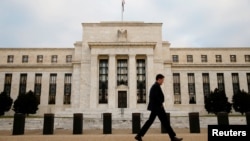U.S. central bank officials delivered an upbeat statement on the economy Wednesday, saying “near-term risks to the economic outlook have diminished.”
The statement came as Federal Reserve officials ended two days of meetings in Washington in the wake of global anxiety over the British vote to leave the European Union and disappointingly weak U.S. job growth in May. Despite strong hiring last month and rebounding stock prices, central bank officials on Wednesday said record-low interest rates would remain unchanged for now.
The last time the central bank raised its benchmark rate — the rate banks and credit unions charge other depository institutions on overnight loans — was December 2015. Currently, the target range for the rate is 0.25 percent to 0.5 percent. Some economists say the rate does not reflect the health of the U.S. economy, and they argue that a rate increase is long overdue.
Unless conditions deteriorate, Bankrate.com’s chief financial analyst Greg McBride said, the Fed’s improved outlook may be a signal to investors that a rate hike is now likely when Fed officials meet again in September. McBride said a rate hike would not happen in November because of the U.S., election, and unless the Fed raises its key rate in September, the only remaining window this year will be in December.
Fed officials had been expecting to raise rates twice this year, but weakness in emerging markets, U.S. growth and, more recently, uncertainty over last month’s Brexit vote put those plans on hold. McBride said, “Waiting too long leaves the Fed with insufficient tools to combat the next economic slowdown or recession.”
Economists say low rates are useful in stimulating investments and job growth. But unchecked, low rates also can lead to higher inflation, which so far has not happened.




